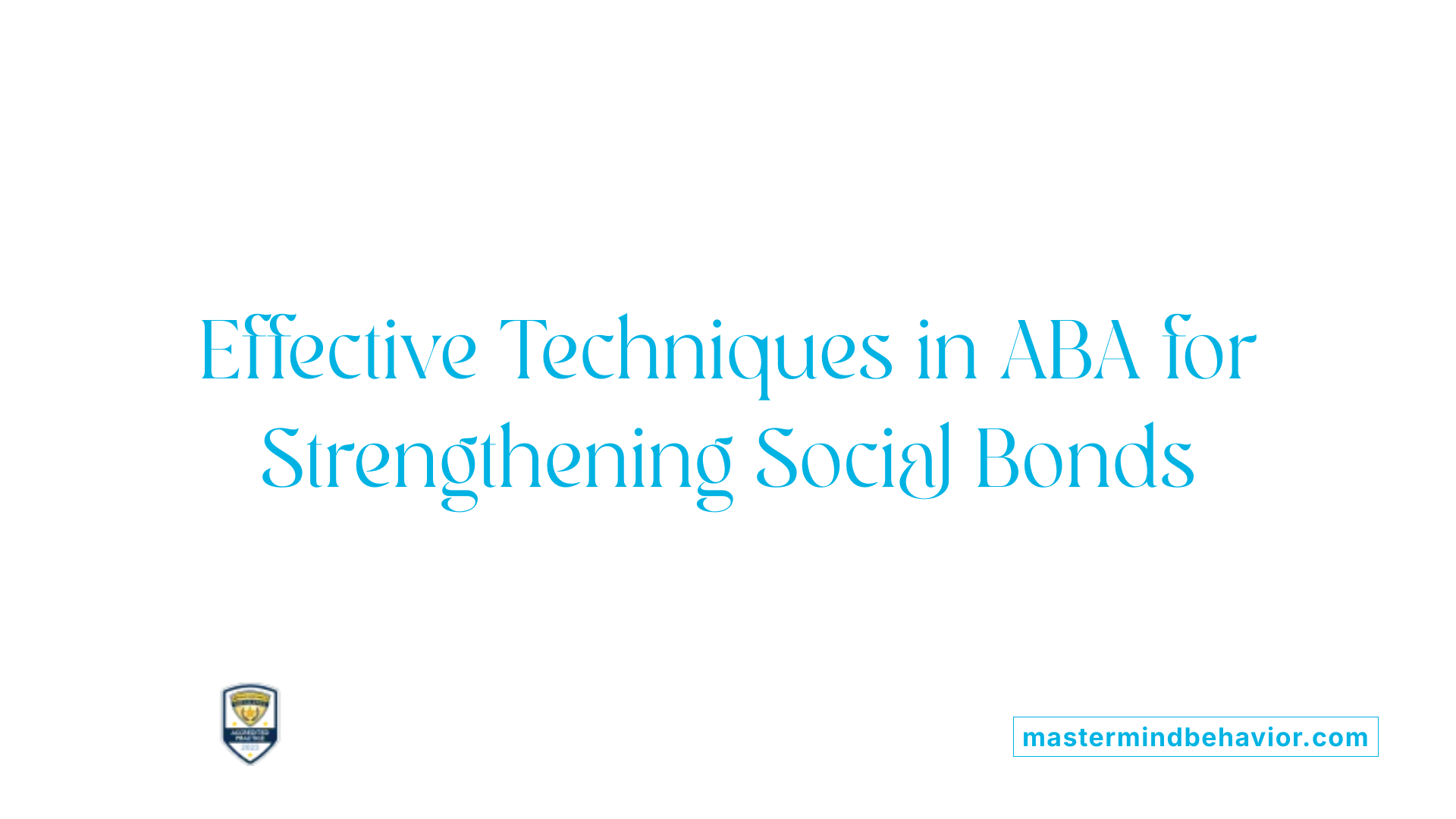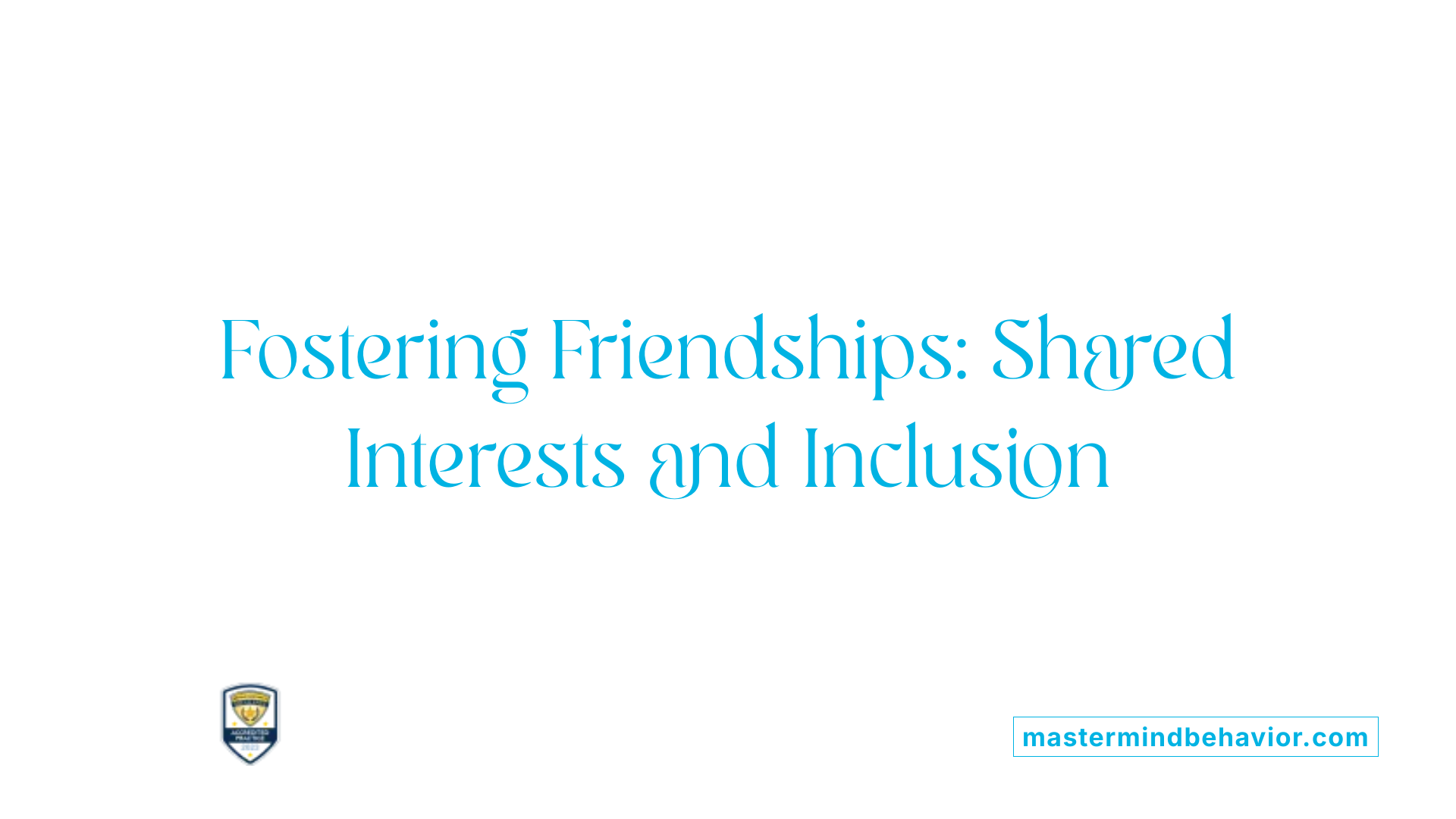Understanding the Foundation of Friendship Building in Children with Autism
Building lasting friendships is a vital aspect of social development and wellbeing for children with autism. Applied Behavior Analysis (ABA) therapy has emerged as a scientifically supported method that systematically enhances social skills tailored to each child's needs. This article explores how ABA supports children in establishing and maintaining meaningful, long-term friendships, emphasizing strategies, benefits, and real-world applications.
Personalized and Structured Interventions in ABA Therapy
How does ABA therapy support social skill development in children, especially in building long-term friendships?
ABA therapy plays a vital role in helping autistic children develop essential social skills that lay the foundation for long-term friendships. This approach offers tailored programs designed around each child's unique needs and strengths, focusing on teaching and reinforcing specific social behaviors.
One of the core elements of ABA is structured teaching. Therapists use methods such as role-playing, social stories, visual aids, and positive reinforcement to help children grasp complex social concepts. For example, children learn how to initiate conversations, respond to social cues like eye contact or tone of voice, and understand unspoken expressions through carefully designed activities.
Peer interaction is integral to ABA interventions. Organized group activities and real-world practice sessions enable children to apply what they've learned in natural settings. Repeated practice promotes mastery and helps children transfer skills learned in therapy to everyday situations—be it at home, school, or community settings.
ABA also targets non-verbal communication, such as recognizing facial expressions, gestures, and body language, which are crucial for understanding others’ emotions and intentions. By learning these cues, children develop empathy, a fundamental aspect of forming and maintaining friendships.
In addition to promoting communication and social awareness, ABA emphasizes teaching patience, turn-taking, sharing, and conflict resolution. These skills contribute to healthier interactions and relationships, fostering confidence and independence in social situations.
Overall, ABA systematically builds social competence through individualized, engaging, and consistent interventions. It equips children with the tools needed for meaningful relationships, helping them enjoy sustained friendships and better social integration throughout their lives.
Techniques and Strategies for Building Social Relationships

What techniques and strategies are used in ABA therapy to foster social relationships and friendship-building skills?
ABA therapy integrates several practical approaches to help autistic children develop strong social connections. One of the primary methods is social skills training, which often involves social stories and comic strip conversations. These tools provide visual and narrative guidance, illustrating appropriate social behaviors and responses in various situations. They make abstract social concepts more understandable for children, gradually helping them learn how to initiate and sustain conversations.
Role-playing exercises are also essential. Through structured scenarios, children practice interactions such as greeting someone, sharing, taking turns, and responding to social cues like facial expressions and tone of voice. These simulated activities enable children to develop confidence and competence in real-world settings.
Visual supports, such as cue cards, checklists, and social flowcharts, serve as quick-reference tools to reinforce social cues and expected behaviors. For example, cue cards might display emotions or questions to prompt children during interactions, aiding in recognizing non-verbal communications or understanding social context.
Peer-mediated interventions involve training typically developing peers to interact with autistic children in natural settings. This approach fosters inclusive play and communication, promoting social learning through peer modeling and shared interests.
Positive reinforcement remains central. Offering something valued—praise, tokens, or preferred activities—encourages children to initiate interactions, maintain eye contact, share, and ask questions. These rewards boost motivation and help reinforce the desired social behaviors.
In addition, ABA emphasizes the importance of skill generalization across different environments. Therapists involve families, teachers, and caregivers to practice and reinforce these social skills during daily activities, ensuring that children can apply learned behaviors in school, home, and community settings.
Overall, ABA combines structured, visual, and social approaches to teach and strengthen social skills, ultimately supporting children in forming meaningful friendships and engaging confidently with others.
The Significance of Play and Emotional Regulation in Social Development

How do structured play sessions promote cooperation?
Structured play sessions in ABA therapy are designed to teach children how to cooperate with peers and adults. These sessions often involve activities like turn-taking, sharing, and following rules that mirror real-life social situations.
During these activities, children practice important social behaviors in a safe, controlled environment. Repetition and positive reinforcement help solidify these skills, making them more likely to be used outside therapy. Games and group activities also teach children to recognize social cues, understand others’ perspectives, and participate actively in group settings.
Why is emotional regulation important in social interactions?
Managing emotions effectively is essential for healthy social interactions. ABA therapy helps children recognize their feelings and develop strategies to stay calm and focused during social exchanges.
When children can regulate their emotions, they are less likely to become overwhelmed or lash out. This ability encourages smoother interactions, fosters patience, and helps build trust with peers and adults. Emotional regulation also supports children in responding appropriately to others’ emotions, deepening their social understanding.
How does understanding non-verbal cues and body language enhance social skills?
Autistic children often have difficulty interpreting non-verbal signals such as facial expressions, gestures, and tone of voice. ABA therapy addresses these challenges by teaching children to recognize and respond to these cues.
Using visual supports and role-playing, children learn to identify emotions based on facial expressions and body language. This understanding improves their ability to engage in conversations, respond empathically, and build stronger relationships.
How does role-playing foster empathy?
Role-playing exercises are a core component of ABA therapy that help children understand others' emotions and viewpoints. By acting out social scenarios, children gain insight into how others feel and what they might need.
Through these activities, children practice responding appropriately, develop a sense of empathy, and learn social problem-solving skills. Role-playing makes abstract concepts concrete, and repeated practice helps embed these skills into daily life.
| Aspects of Social Development | Techniques Used in ABA | Benefits for Children |
|---|---|---|
| Cooperation and turn-taking | Structured play, reinforcement | Improved group participation, |
sharing skills | | Emotional regulation | Visual supports, coping strategies | Reduced anxiety,| better social patience | | Interpretation of non-verbal cues | Role-playing, video modeling | Enhanced understanding of emotions and| body language | | Empathy and perspective-taking | Role-playing, social stories | More compassionate responses,| better friendships |
ABA therapy supports children’s social growth by combining these strategies. It encourages engaging play, managing feelings, understanding body language, and developing empathy, all crucial for building lasting relationships and thriving socially.
Building Friendships Through Shared Interests and Inclusive Environments

What are the benefits of ABA therapy in improving children’s ability to initiate and maintain long-term friendships?
ABA therapy provides substantial support in helping children develop the skills needed for long-lasting friendships. It focuses on enhancing social abilities such as initiating conversations, responding to social cues, sharing, turn-taking, and active listening. These skills are taught through engaging, structured activities like role-playing and social stories, which simulate real-world interactions.
Positive reinforcement plays a vital role in ABA, encouraging children to practice and reinforce desired behaviors like eye contact, appropriate greetings, and emotional recognition. As children experience success in social settings, they gain confidence which encourages them to engage more comfortably with peers.
Early, personalized interventions help children build crucial skills such as emotional regulation and expressive language. These foundational skills make social interactions less intimidating and more predictable.
Over time, ABA therapy promotes the consistent application of social skills across different environments—home, school, and community—thus aiding children in forming and maintaining meaningful friendships. This holistic approach results in children becoming more adept at connecting, sharing, and navigating social relationships independently.
Generalization of Social Skills and Real-World Application
How does ABA therapy support the generalization of social skills in various environments and situations?
ABA therapy is highly effective at helping autistic children transfer social skills across different settings such as home, school, and community. This process, known as generalization, ensures that children can apply what they learn in one environment to others, leading to more consistent and meaningful social interactions.
One way ABA achieves this is through consistent practice and reinforcement of social behaviors in multiple contexts. For example, a child might learn to initiate conversations during a therapy session, then practice this skill during playdates or in classroom settings with teachers and peers. Involving family members, teachers, and caregivers in the training process is critical. They are encouraged to reinforce skills regularly and apply similar strategies at home or in other social settings.
Visual supports, such as social stories and visual schedules, are adapted for different contexts to help children understand and remember social expectations. Role-playing exercises are also tailored for specific environments to reinforce appropriate responses and behaviors.
Supporting ongoing friendship maintenance is another important aspect. Children are taught social skills like sharing, turn-taking, and emotional regulation, which they practice regularly. Technology and social media tools can facilitate communication and help maintain friendships, especially for children who might feel anxious or have difficulty in face-to-face interactions.
Finally, educating peers about autism and promoting inclusive environments—such as autism-friendly community events—further supports social skill transfer. All these strategies collectively help children develop confidence and competence in social situations across various settings, fostering greater independence and social success.
The Science Behind ABA and Its Continuing Effectiveness

How does ABA therapy support social skill development in children, especially in building long-term friendships?
ABA therapy, grounded in decades of scientific research, plays a vital role in helping children with autism develop essential social skills that serve as a foundation for forming and maintaining friendships.
At its core, ABA uses structured, personalized interventions that focus on teaching specific social behaviors. Children learn to initiate and maintain conversations, respond to social cues like eye contact and tone of voice, and understand gestures and facial expressions. Techniques such as role-playing and social stories are employed to simulate real-life interactions, offering children a safe space to practice and refine their skills.
Visual supports and reinforcement strategies are integral in helping children grasp social concepts and stay motivated. Rewards like praise or preferred items encourage repetition of positive behaviors, making social interactions more rewarding.
Group activities and community-based exercises promote peer interaction, allowing children to apply new skills in real-world settings like home, school, or social clubs. These settings help children generalize their skills across various environments, laying the groundwork for lasting friendships.
Moreover, ABA emphasizes recognizing non-verbal communication and understanding emotional cues, which are crucial for developing empathy. Teachers and therapists often incorporate activities that teach children to observe facial expressions, body language, and other gestures, fostering a deeper understanding of others' feelings.
By systematically teaching social skills and encouraging positive social experiences, ABA therapy empowers children to build confidence, navigate social situations comfortably, and develop meaningful, long-term friendships. This approach not only enhances immediate social competence but also supports ongoing social integration and emotional well-being.
Empowering Children for Lifelong Social Connections
ABA therapy, supported by extensive research and tailored to individual needs, plays a crucial role in helping children with autism develop the social skills necessary for forming and maintaining long-term friendships. Through evidence-based techniques, real-world practice, and family involvement, ABA enhances communication, empathy, and social competence. As children build these vital skills, they gain confidence and independence, creating more opportunities for meaningful, lasting social relationships. This foundation not only benefits their social lives but also contributes to their overall well-being and integration into their communities.
References
- ABA Therapy for Enhancing Social Skills in Children
- Autism and Friendships: Building Connections
- What is ABA? | Autism Resources
- Applied Behavior Analysis (ABA)
- The effectiveness of applied behavior analysis program ...
- Enhancing Social Skills Through ABA Therapy
- Benefits of ABA Therapy for Children with Autism
- Benefits of ABA therapy: 4 benefits you should know
- Applied Behavior Analysis (ABA)
- Developing Social Skills Through ABA Therapy for Autism








